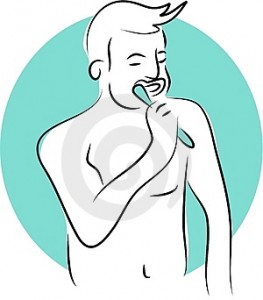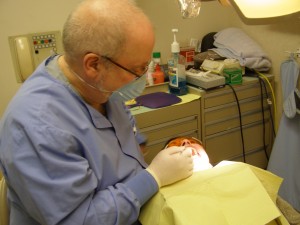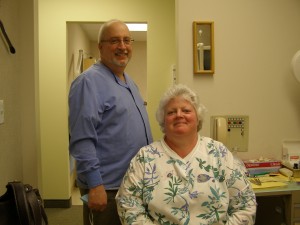by Michelle Sutton-Kerchner
Dental hygiene is more than cleanings and the occasional cavity filling. It can provide telltale signs of your overall health. Your mouth speaks without saying any words …
No part of the body works alone. Our physical structure is a complex connection that communicates and transports. The mouth, although its own habitat, directly relates to the rest of the body. It is where digestion begins, sinuses drain, and numerous bacteria form and live. Imbalances and ailments here can indicate disaccord elsewhere. And illness elsewhere can cause poor dental health.
All nutrition– food, vitamins, and supplements– enter the body through the mouth. The condition there affects any intake’s initial consumption. Food and water remain in their best form when consumed by a clean, healthy mouth. A healthy body starts with healthy teeth and gums that create an environment in which bad bacteria cannot easily survive.
 With proper care through daily brushing and flossing, the body’s natural defenses can keep harmful bacteria under control. A sloppy job at the sink can be the culprit of a new cavity or gingivitis, the mildest form of gum disease. Certain medications or procedures can cause dry mouth, create an unhealthy balance of bacteria in the mouth, or breach protective barriers so bacteria more easily enters the bloodstream. Some diseases have a direct effect on oral hygiene, and the reverse. Knowing the cause-and-effect allows quick diagnosis and treatment of any lurking problems.
With proper care through daily brushing and flossing, the body’s natural defenses can keep harmful bacteria under control. A sloppy job at the sink can be the culprit of a new cavity or gingivitis, the mildest form of gum disease. Certain medications or procedures can cause dry mouth, create an unhealthy balance of bacteria in the mouth, or breach protective barriers so bacteria more easily enters the bloodstream. Some diseases have a direct effect on oral hygiene, and the reverse. Knowing the cause-and-effect allows quick diagnosis and treatment of any lurking problems.
The Heart Health Link
Recent studies indicate flossing helps prevent heart disease. Good oral hygiene is proven to benefit heart health. Poor oral health is a contributing risk factor for cardiovascular illness. With each swallow, bacteria from the gums, teeth, and mouth travel through the body. This bacteria can attach itself to fatty plaques in your arteries (atherosclerosis), and cause further inflammation of these deposits. The plaque can burst and form a blood clot, which may trigger a heart attack or stroke.
The evidence is not clear yet, but studies continue to show this connection. One study suggested a quick peek in the mouth could predict heart health as closely as cholesterol levels. Gum disease, cavities, and missing teeth are indicators of one’s overall health.
Beyond the scientific connection, one can assume secondary reasons for the correlation. For example, the owner of many cavities may have a diet high in sugar and carbs, which affects his/her heart health as well. Or, the neglect of oral health could indicate an absence of overall self-care. Many skeptics struggle to relate oral and cardiovascular health, despite evidence. It just seems too “far a stretch” from mouth to heart.
A study published in Circulation: Journal of the American Heart Association followed 657 people without known heart disease. Those with higher blood levels of certain disease-causing bacteria in the mouth were more likely to have atherosclerosis in the carotid artery (found in the neck). Clogging of the carotid arteries can lead to stroke.
Swollen gums are another suspicious factor. Chronic inflammation from periodontitis, and other severe gum diseases, is linked to heart disease, stroke, and clogged arteries. The body responds to infection with the automatic defense of inflammation.
Perhaps oral bacteria from the mouth travels through the bloodstream, triggers an inflammatory response in the blood cells, and endangers the heart through narrowing arteries in this way. This possibility is enlightening. It links diseases such as periodontal, heart, and arthritis to an individual’s unique inflammatory response.
Typically, the person at risk is already predisposed to heart disease from other factors. Floss until your heart’s desire, you cannot undo genetics, high cholesterol, and other contributors to heart disease. Alas, a heart attack cannot be brushed away.
Good dental hygiene does not negate smoking cigarettes or skipping workouts. But, poor oral health may advance an already risky situation. Practicing good dental hygiene is simply one step toward your best health to be combined with proper diet and exercise.
Other Connections
There also is a proven relationship between oral health and other diseases and conditions. They are interrelated; either affecting, or being affected by, that which transpires in the mouth.
- Pregnancy: Gingivitis occurs in 50 to 70 percent of pregnant women due to fluctuating hormone levels. This increases risk of low-birth-weight and premature babies.
- Diabetes: With a compromised immune system, the gums are at risk. Blood sugar fluctuations can increase frequency and severity of infections in the gums and bones that house the teeth. More teeth may be lost in this population than those with consistently healthy blood sugar levels. A mouth infection can also make it a challenge to control diabetes.
- Endocarditis: Along with gum disease, oral surgery that cuts into the gums may spread harmful bacteria into the bloodstream. An already weakened immune system or damaged heart valve makes you susceptible to infection in other areas, including the heart’s inner lining. If you have heart disease, speak with your dentist about the need for antibiotics before oral surgery to help prevent infection.
Other conditions associated with oral health include HIV/AIDS (through painful mucosal lesions), osteoporosis (periodontal bone and tooth loss), and immune system and eating disorders.
Don’t Limit Yourself

We meet for coffee, snack during a show, share a celebratory dinner. Many of life’s delights involve eating in a social setting. Life’s simplest pleasure can be a special meal or homemade dessert. Poor dental hygiene can rob us of this experience.
According to Dr. Edward Reisner, D.M.D., M.A.G.D. of Alpha Dental Associates, “As we age, individuals who neglect their oral health must confront severe quality-of-life issues. The ability to bite into an apple rather than be limited to applesauce may sound minor, but not to the person with such limitations.”
He continues, “Eating is a social as well as vital function. A lifetime of good dental care allows us to enjoy the pleasure of joining friends in this social interaction. It helps increase our lifespan, and improve the quality of it.”
Exercise for a Better Smile
Those weights you lift on the Exercise Floor and that Group Fitness class you sweat (and smile) your way through improve your oral health, too. Just as exercise benefits your body in countless other ways, it also is linked to the state of your mouth. The healthier you are as a whole, the healthier each individual element of yourself. Proper exercise and diet allows the body to thrive, head to toe.
A study of 12,110 participants, conducted by Dr. Mohammad S. Al-Zahrani, observed the effects of exercise on oral health. The groups were divided into those who ate healthy and exercised at least three times a week, and those who didn’t exercise and follow a nutritious diet. The consistent exercisers who ate healthy had healthier gums, evidenced by the absence of bleeding gums and bad breath, even upon awakening.
This finding agrees with a 2011 article published in the Journal of Periodontology. The article indicates those who “participate in high levels of fitness and maintain a healthy weight are less likely to show symptoms of gum disease.” The study was conducted using body mass index (BMI) measurements and maximal oxygen consumption of participants in combination with oral exams.
Gum disease was shown as related to other physical conditions, such as cardiovascular disease and diabetes. The study’s outcome reveals the rationale behind caring for the entire body–including one’s oral health– through diet and exercise.
The American Dental Association recommends everyone brush and floss their teeth twice daily, consume a balanced diet, and visit their dentist regularly. Based on current findings, exercise soon may be added to their recommendations.
To improve oral health, healthcare experts suggest these tips:
- Maintain a healthy weight
- Eat nutritious foods
- Exercise most days of the week
- Control conditions that increase risks, such as diabetes, high cholesterol, or high blood pressure

Bi-annual dental exams can also reveal underlying health issues. A perfect example is heart disease, a stealthy invader. You cannot feel cholesterol rise or arteries clog. (Although some may after a bacon double-cheese burger.) Yet bleeding, sore gums may be an outward sign of trouble elsewhere. It’s a signal your dentist is trained to notice. From discovering tonsil stones (yes, they exist) to removing plaque, a regular visit to the dentist helps assure overall health.
Your smile says a lot about you. Perhaps more than you realize. Keep it healthy.
Sources
“Exercise & Oral Health,” by Mark Paulsort at www.miamidentalsedationspa.com.
“Oral Health: A Window to Your Overall Health,” at www.mayoclinic.com.
“Periodontal Disease and Heart Health: Brushing and Flossing May Actually Save Your Life,” by R. Morgan Griffin at www.webmd.com.
“Pregnancy Gingivitis and Pregnancy Tumors,” at www.webmd.com.
“The Mouth-Body Connection,” reviewed by faculty of Columbia University College of Dental Medicine at www.colgate.com.
Image Credits
Man brushing teeth: © Dawn Hudson at www.dreamstime.com
 Fitness & Wellness News Your Source for Fitness News, Wellness News, Health News, and Nutrition News!
Fitness & Wellness News Your Source for Fitness News, Wellness News, Health News, and Nutrition News!



